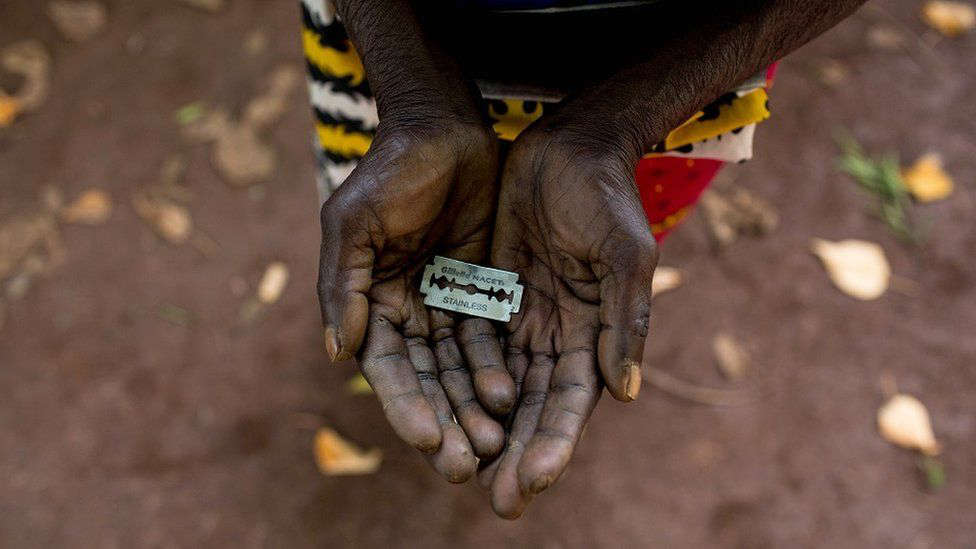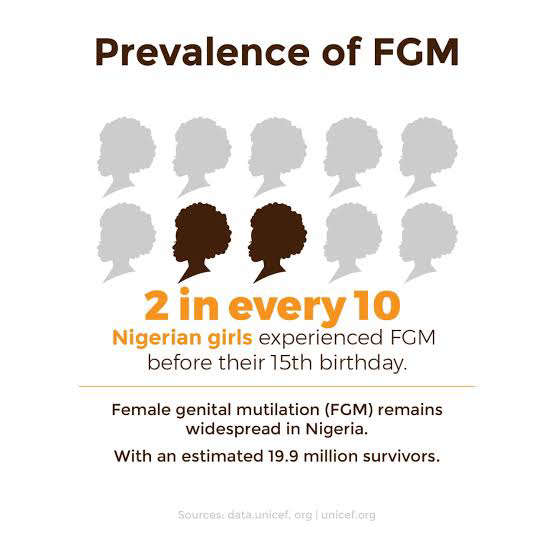
It was a rude shock for Linda (not her real name), a teenage girl, when her mother told her she was circumcised at birth.
Now married, Linda describes her experience of having sexual relations with her husband. "It was a necessary evil in my eyes, it was overrated in my heart, and of course, it brought a bit of conflict, ‘cause he didn't just understand what the problem was, I never seemed interested," she said.
Female Genital Mutilation (FGM) includes "all procedures involving partial or total removal of the external female genitalia or other injuries to the female genital organs for non-medical reasons,” according to the World Health Organisation (WHO). It damages anatomic structures that are directly involved in female sexual functions, and can therefore also affect women’s sexual health and well-being. For Linda, her resolve was: "my partner and I are willing to do the extra work to help me. Understanding has helped me conquer baby steps in this (sexual relations) area because it would have brought serious problems, I know it has brought serious problems for couples."
Stakeholders renewed calls for an end to FGM as the world marked the International Day of Zero Tolerance for Female Genital Mutilation on the 6th of February, 2023. It’s a day that avails all stakeholders involved in ending FGM an opportunity to celebrate achievements, advocate for an end to the practice, and raise awareness.
Mrs. Lola, the founder of “Women Against Violence and Exploitation” foundation, and an FGM survivor devotes her time, to sensitizing rural women in the Northern part of Nigeria about the dangers of female genital mutilation. "We also provide support services to survivors,” she said. “Some don't even know that they're FGM survivors, so I tell people that I'm a survivor and that I've gone through therapy and it's important for you to come out and seek help. If you need medical services or even psychological services, any kind of support that can add to your well-being, that's also one of the things we do," she said.
On the International Day of Zero Tolerance for Female Genital Mutilation, the United Nations International Children's Emergency Fund (UNICEF) warned that female genital mutilation is on the rise among Nigerian girls aged zero to 14. It said the rate of mutilation has risen from 16.9 percent in 2013 to 19.2 percent in 2018, a “worrying trend” according to the UN organization.

The aid agency also said Nigeria accounts for the third-highest number of women and girls who have undergone FGM worldwide, with an estimated 19.9 million survivors. As if this data is not already alarming enough, UNICEF still projects that about four million girls are at risk of FGM this year 2023.
The report from UNICEF is a pointer that there is s a need for continued and massive advocacy against FGM in Nigeria, beyond the one-day international observance.
Mrs. Lola believes continued advocacy will help bring this harmful practice against women and girls to a stop. "People think FGM is a cultural practice, that it's something that is part of us and so it should go from generation to generation, but with awareness and with education we now know that FGM is a harmful practice that needs to stop," she said.
Female Genital Mutilation, like some other harmful cultural practices against women and girls including widowhood practices and forced marriages, are sometimes carried out by women. These women are mostly in rural areas, uneducated and uninformed, and the cutting is one way they make ends meet. In recent times,some of the cutters are health practitioners who feel they're carrying on with their cultural heritage in a better way since the equipment they use is sterilized. Gender advocate, Iyingi Irimagha thinks getting another means of livelihood for these people is a factor in stopping FGM. "If you're going to stop FGM, you must look for alternative means of livelihood for those who depend on it, because sometimes the holding on to these harmful traditional practices is not because they believe that the practice is going to do anything for the woman, it's just because that's how they make their money."
In 2015, the Nigerian government passed the Violence Against Persons Prohibition (VAPP) Act into law. More than 30 states have domesticated the VAPP Act which not only criminalizes FGM but also makes other forms of gender-based violence, including rape, spousal battery, forceful ejection from home, and harmful widowhood practices punishable offenses in Nigeria. Section 6 of the Act provides a set of punishments for FGM, which includes two to four years imprisonment and a maximum fine of N200,000. But the extent to which this law has curbed FGM and other gender-based violence remains to be seen. "When you pass laws like this, the law is different from the community interpreting it in their own way by setting their local laws and prohibition policies to stop FGM,” Iyingi said. For days like this (international observance), what we can do is highlight the fact that there's a law that prohibits FGM in Rivers State."
The practitioners of Female Genital Mutilation believe the violence keeps the girl-child from being highly sexually active. But, with such a crude culture that has lasted centuries, it begs the question, "how come more women are victims of rape?"
For an effective campaign against female genital mutilation, and other acts of gender-based violence, stakeholders like Iyingi Irimagha re-echoed the need for continuous sensitization and for men to also join in the advocacy. "Raising the voices of men, the fathers of these children or husbands of these women who have been circumcised and they have had to deal with the repercussions, practically showing people that there is no advantage whatsoever," she added.
Gender advocates, human rights activists, health practitioners, NGOs, traditional rulers, religious leaders, legal practitioners, governments at all levels, men and women, everyone must lend their voice and join the advocacy against the practice of Female Genital Mutilation so that it would be stopped just like the killing of twins was halted a long time ago in Calabar.


